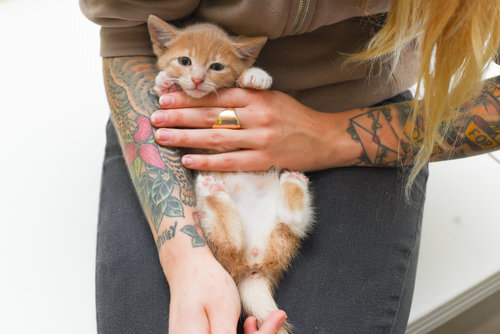Planning for Foster Kittens
All good things start with a plan. Before you bring home your foster kittens, prepare yourself with the following considerations!
"Do I Have Enough Space?"
It doesn’t matter if you have a studio apartment or a six-bedroom house -- kittens don’t require that much room! A small carrier is enough space for a newborn kitten, and as they get older they can be upgraded to a playpen or a small room. What’s most important is that their space is safe, soft, temperature-controlled, separated from other animals, and easy to sanitize.
To prepare your space, place a comfortably warm heating pad in the kitten’s carrier or playpen, leaving enough space for the kitten to escape the heating pad if desired. Line the space with a soft baby blanket. Kittens over 3 weeks should also get a litter pan. Check out the supplies page for product recommendations!
"How Much Time Does This Take?"
Taking care of a kitten is a short-term commitment, but a full-time investment. Typically, kittens are adopted out between 8-9 weeks old, which means you should plan to have them for up to two months depending on their age when you take them home. Although around-the-clock care is required (for example, middle of the night bottle feedings until they’re weaned), it only takes a few minutes every few hours to save a life. This intensive care is over before you know it, and you'll make a lifelong impact!
If you know you're unable to provide care every day until they're 8 weeks old, don't fret. Talk to your foster coordinator or your friends and loved ones and see if you can find someone to co-foster. Co-fostering allows you the flexibility to take a weekend off and can make a huge difference in your capacity to save lives.
Once kittens are weaned (around five weeks old), they can be left for longer periods of time, such as overnight or during the work day. For this reason, people who are concerned about time should consider fostering weaned kittens. Alternately, fostering a mama cat and her babies is a great way to save lives without a huge time commitment. You care for the mama...mama cares for the babies!
"How Will My Pets React?"
For the health, happiness, and safety of all, it's best if your foster kittens are kept in a separate location from your personal pets. Orphans have small, vulnerable bodies that are susceptible not only to injury, but also to illness due to their compromised immune systems -- so you'll want to keep them separate from your own animals even if they appear healthy. Moreover, kittens often have unknown health history and could put your cats at risk if they are exposed to saliva or feces. Keep your personal pets up-to-date on vaccines and consider a quarantine of at least 12-14 days if you do plan to introduce a foster kitten. However, because introductions can be stressful for all, you are often better off keeping the animals separate.
"What Do I Do When I'm at Work?"
Have kitten, will travel! Talk to your employer about fostering in the office...you may be surprised to find that they say yes. As kittens sleep 18-22 hours a day, their presence beneath your desk will barely be noticeable. Assure your supervisor that the kittens will be non-intrusive and suggest a test run; kittens cause minimal distraction and many employers are happy to say yes. If your office has a firm no-pet policy, there’s always the option of co-fostering with a friend or a loved one, fostering weaned kittens over 5 weeks of age (who can stay at home during the work day), or fostering a mama cat and her babies!
"Is It Expensive to Foster?"
Veterinary care is usually provided when fostering through an animal shelter or rescue group, and many groups also provide some or all of the supplies needed to feed and care for the animals. Do your research and chat with your local organization in advance to determine your total out-of-pocket cost...you may be pleasantly surprised! If you do have to cover some of the expenses, it's easy to set up an Amazon Wishlist and ask your friends and coworkers to pitch in.
"Who Can I Turn to for Help?"
Before you dive in, make sure you have a veterinarian lined up so you know who to call in case of illness. You may also benefit from connecting with other caregivers, even if only online -- mentorship changes everything! Connect with the kitten community and you’ll always have someone to turn to for support. Some good places to start might be by meeting people through your local shelter, or joining an online group such as the Orphan Kitten Bottle Feeders group on Facebook.
"How Am I Ever Going to Say Goodbye to My Foster Kittens?"
Kitten rescue isn’t about collecting cats – it’s about saving lives. As hard as it may be to give up a foster, remember that there are dozens more waiting in the wings that will desperately need rescue, too. Goodbye is the goal of fostering -- it's your parameter for success. Rather than feel sad, take time to celebrate what an incredible impact you have made! You've saved a life, and your brave selflessness will allow you continue to save lives!
Watch my "Foster Failing" video to find out why it's important to say goodbye to foster kittens!





